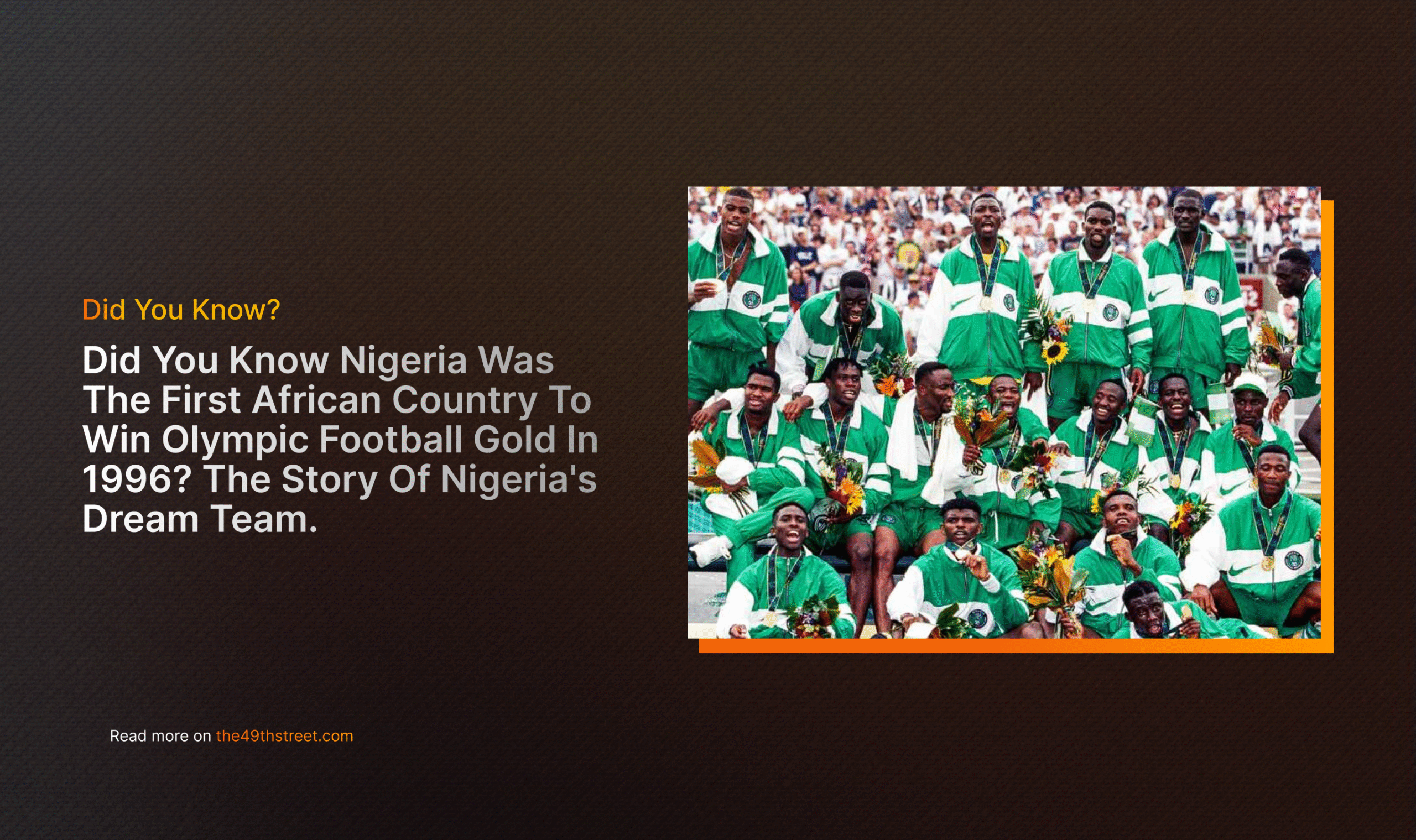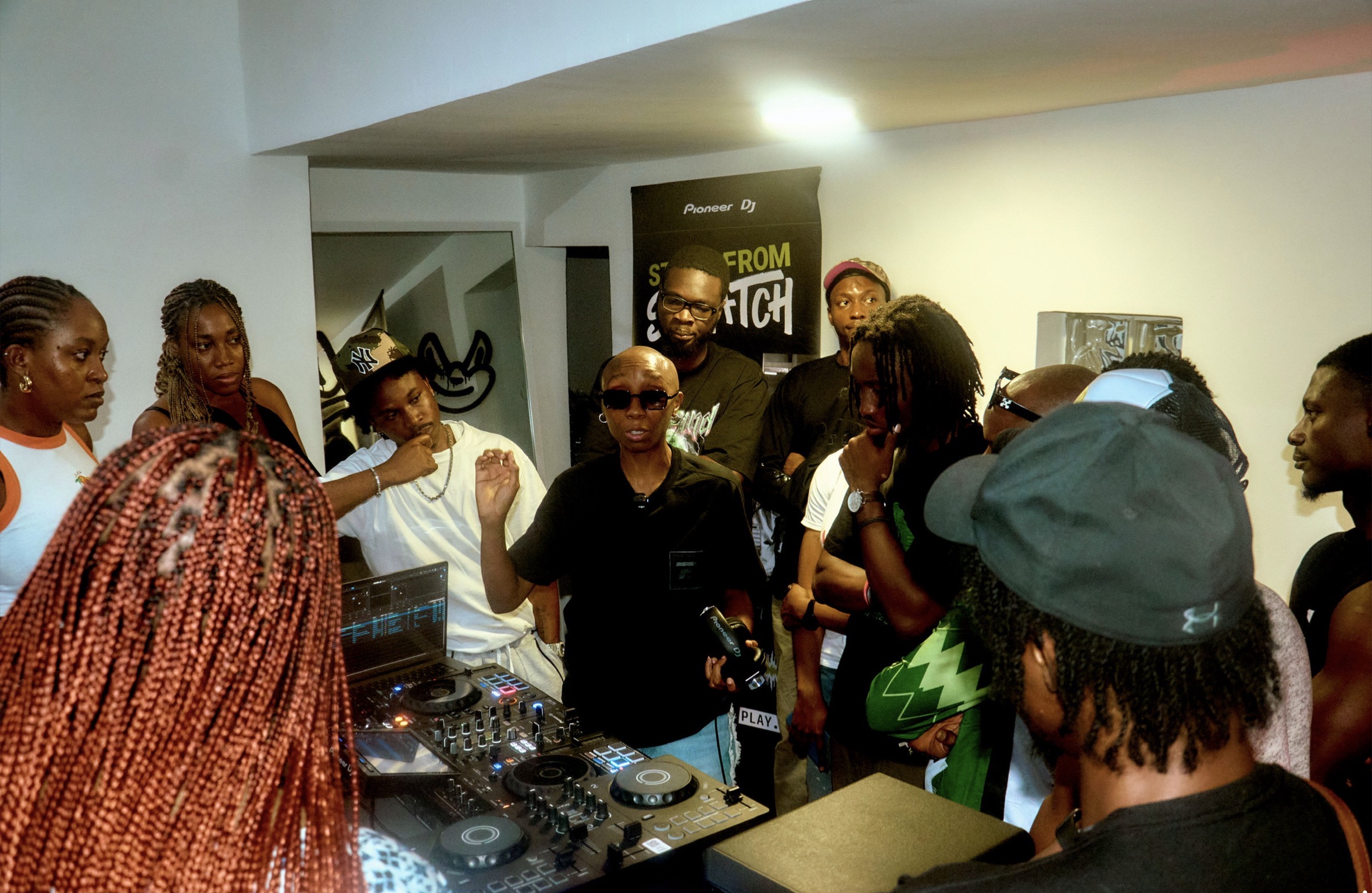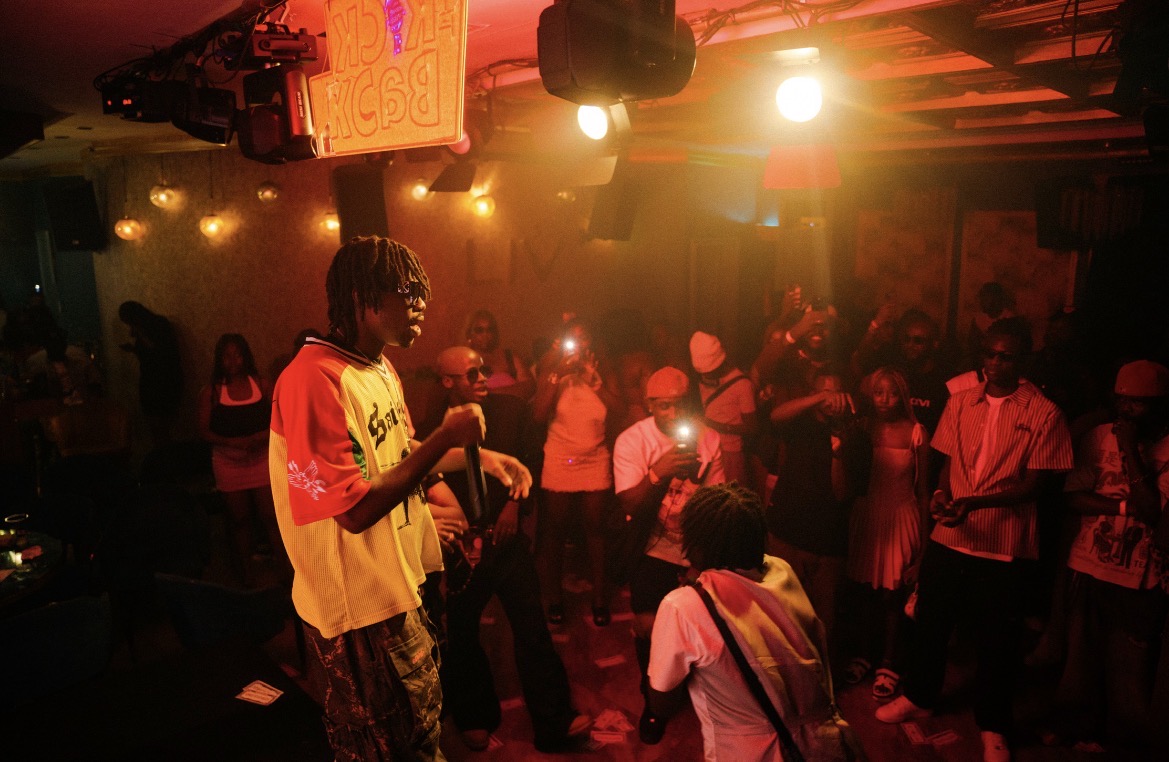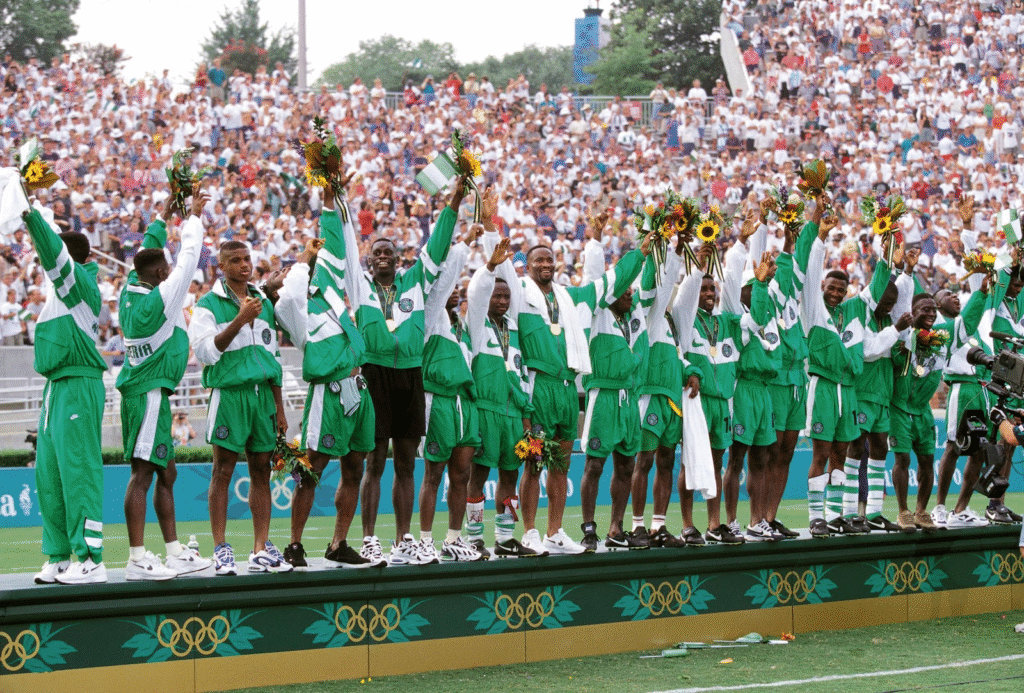
Argentina? Annihilated! Brazil? Vanquished! Mexico? Eliminated!
Nigeria’s unprecedented triumph at the 1996 Atlanta Olympics is undoubtedly one of the greatest moments in African football history. The name ‘Dream Team’ was coined for The star-studded team that made the whole continent believe again, cementing Nigeria’s status as a powerhouse on the global football stage. A fabled part of Nigerian football folklore, the older generation has raved endlessly to Gen Zs about that campaign in admiration.
The Road to the Dream Team: Nigeria’s Footballing History Pre-1996
The beautiful game has been the heartthrob of all Nigerians for decades. For decades, it has served as a uniting factor and an escape from the harsh realities of life in the West African country.
Post-independence, Nigeria slowly became prominent on the African continent’s football stage. The Giants of Africa first appeared at the African Cup of Nations in 1963 and crashed out in the group stage of their maiden continental tournament. Nigerians witnessed a steady improvement in the national team’s performances as the years went by. They registered 3rd-place finishes at the 1976 and 1978 African Cup of Nations editions.
The crowning moment came in 1980 as the Super Eagles squad, called Red Devils then, led by Segun Odegbami, Best Ogedegbe, Christian Chukwu, and Mudashiru Lawal, triumphed on home soil, giving Nigeria its maiden continental title. Odegbami finished as the joint highest goalscorer, having notched a brace in the final to hand his team the trophy. Subsequently, they lost two AFCON finals to arch-nemesis Cameroon in 1984 and 1988.
Nigerians grew dissatisfied with the national team following lackluster performances and repeated continental failures. In 1989, following Nigeria’s failure to qualify for the 1990 FIFA World Cup, Clemence Westerhof was appointed the new head coach. The Dutch manager was tasked with rebuilding the team and overseeing the resurgence of the African giants.
Newly appointed head coach Clemens Westerhof personally scouted players at home, journeying around Nigeria to spot the best budding talents. He had a good eye for spotting prodigies across the local leagues and youth tournaments. He is widely credited with overseeing the Golden Age of Nigerian Football.
Westerhof revamped the flailing National team and boldly replaced old team members with young guns. Jay-Jay Okocha, Sunday Oliseh, Nwankwo Kanu, Rashidi Yekini, and Daniel Amokachi received national team call-ups during his tenure. His impact on the team was immediate as they finished as runners-up to hosts Algeria in AFCON 1990 and third in 1992.
Having clinched silver and bronze medals in 1990 and 1992 respectively, The Super Eagles were fully intent on capturing glory at AFCON 1994. The Nigerian team was unstoppable in the tournament, and their run at Tunisia 1994 culminated in the West African country’s second continental title, its first title in 14 years. Westerhof’s new look team was the real deal! Rashidi Yekini clinched the Golden Boot and Golden Ball as Nigeria defeated Zambia in the final.
Following their continental conquest, the Nigerian team was ranked an all-time record fifth globally in the FIFA rankings. A National and Continental record!
The Super Eagles team qualified for the 1994 FIFA World Cup, its maiden World Cup campaign. Arriving as African Champions, they were imperious in the group stages, only falling once to an Argentine side. They topped their group and progressed to the knockout stages.
The Super Eagles took on Italy in the Round of 16 and were a breath away from the quarter-finals, only to be thwarted by Roberto Baggio’s late equaliser and his winner in extra time. Despite their early exit, they were one of the most entertaining teams at the tournament. No Nigerian team has made it past the Round of 16. Westerhof quit the national team immediately after USA ‘94, ending his successful stint at the helm.
Africa at the Olympic Games’ Football Tournament
African teams had an unsuccessful history in football at the Olympic Games. No African team had clinched an Olympic medal in the beautiful game until the early 90s. Egypt was the first African nation to finish fourth in the men’s football tournament, while Zimbabwe came close in Seoul 1988, finishing in fifth place, and they stole hearts with their remarkable performances.
Ghana broke the African continent’s medal jinx and underscored the African continent’s emergence on the global stage at Barcelona 1992. They built on the foundation laid by Zimbabwe and became the first African side to win a medal, clinching a bronze.
Nigeria had appeared at three Olympic Games in the football category but failed miserably, boasting zero wins across three editions in 1968, 1980, and 1988, respectively. The Nigerian team qualified for the Olympic Games in 1996, making its first appearance in eight years.
Assembling the Nation’s Finest
Westerhof’s assistant and compatriot, Jo Bonfrere, took over as the head coach of the Super Eagles and was tasked with leading the Nigerian team at the Olympic Games. Olympic rules had been revamped since Nigeria’s last appearance at the tournament; teams were now mandated to field U-23 Players, with a maximum of three over-23 players allowed per squad. Luckily for the Nigerians, several core members of the National senior team were young players and fell into the bracket for selection.
Jo Bonfrere benefited greatly from Westerhof’s immense work, and the latter laid the framework for his selection. His 18-man squad featured a perfect blend of youth and experience and a precise combination of technical brilliance, sheer talent, and physical strength. Most of the players were playing for top European Clubs at the time of the selection.
The 18-man squad
Celestine Babayaro, Emmanuel Babayaro, Taribo West, Nwankwo Kanu, Uche Okechukwu, Emmanuel Amuneke, Tijani Babangida, Wilson Oruma, Teslim Fatusi, Jay-Jay Okocha, Victor Ikpeba, Abiodun Obafemi, Garba Lawal, Daniel Amokachi, Sunday Oliseh, Mobi Oparaku, Kingsley Obiekwu, and Dosu Joseph
The squad was filled with African continental Champions like Ikpeba, Oliseh, Amuneke, Amokachi, Okocha, and Okechukwu. Nigeria’s three overaged players were Daniel Amokachi, Emmanuel Amuneke, and Uche Okechukwu. Nwankwo Kanu was named Team Captain. The talismanic striker was tasked with leading the young team.
The team boasted an undying spirit and an unbreakable bond.
Chaos Behind the Scenes: Financial Struggles and Logistical Setbacks
Off the pitch, their journey was fraught with challenges and turmoil. Their preparation for the Games was overshadowed by crippling finances and recurrent disputes between the Nigeria Football Federation (NFF) and coaching staff, a generational vicious cycle.
The players bore the brunt of the NFF’s ineptitude during the tournament. Logistics were nothing to write home about, and some players had to pay for team expenses with their credit cards, charter buses for the team, and even drive the buses to and from training themselves.
“At the Olympic Games, the Nigerian team stayed in a motel that cost $10 a night. We were packed in a room. Two would sleep in a bed, and others would sleep on the floor. After two hours, we would change. It was madness,” recalls West.
Players had to wash their training kits and match-worn jerseys themselves. Nonetheless, they remained unperturbed by their challenges and didn’t allow off-field issues to impact their on-field performance.
Jo Bonfrère’s Nigerian team was billed as underdogs and had big aspirations of making their mark in the tournament. They were named in a challenging Group D alongside Brazil, Hungary, and Japan.
“Our preparations before arriving in the United States weren’t particularly good. We lost to Togo in Lagos, and our supporters kept on saying we were useless. We landed in Tallahassee, Florida, where we faced some logistical problems. It wasn’t easy, but we kept believing thanks to the fact that we had a squad filled with top players like Jay‑Jay Okocha, Nwankwo Kanu, and Taribo West,” Ikpeba said in an interview with FIFA.
Road to Gold: Nigeria’s Dream Team Atlanta ’96 Run
Breaking Barriers: A Historic Group Stage Journey

Nigeria got off to an excellent start in the tournament, defeating Hungary in their opening group stage fixture. A lone goal by Nwankwo Kanu in the closing minutes of the first half was the difference between the Nigerians and their European opponents.
They clinched a resounding 2-0 victory over Japan in their second group stage fixture. The game was deadlocked until Tijani Babangida found a breakthrough in the 82nd minute, and Jay Jay Okocha netted a penalty on the stroke of the 90th minute to seal the win. They were handed their first defeat of the tournament by Brazil in their final group stage fixture. A lone strike by Ronaldo on the stroke of the half-hour mark proved to be their undoing. They finished second to Brazil in Group D.
Despite their defeat to Brazil, the Super Eagles narrowly beat their Japanese counterparts to a spot in the knockout stages due to their superior goal difference. They became the first Nigerian side to progress out of the group stages in Olympic football history.
Defying Giants: The Road Through the Knockouts
The entertaining Nigerian side saw off Mexico with a comfortable 2-0 victory in the quarter-finals. Both sides had a player sent off in the match, finishing with 10 men. Okocha opened the scoring with a long-range, unstoppable rocket, and Celestine Babayaro added the icing on the cake to ensure their progression to the next round.
On the 31st of July, 1996, they faced their familiar foes, Brazil, in the semi-finals. The formidable Brazilian team had handed them their only defeat in the competition, and they were out to exact revenge. Stopping the Samba boys required a monstrous performance and a bit of luck. They knew they had to be at their best to clinch a result over the side that knocked Ghana out in the semifinals.

The Seleção boasted some of the best talents in football, including Ronaldo, Rivaldo, and Roberto Carlos, and was a favourite for the tournament. The match started on the possibly worst scenario for the Nigerians as they fell to a well-taken free kick in the game’s opening minute. They had a stroke of fortune as Roberto Carlos turned the ball into his net in the 20th minute of the game. Their joy was short-lived, as the Samba boys, through Bebeto and Conceicao, notched unanswered goals.
The Dream Team was two goals down against a Brazilian team at the halftime whistle. 45 minutes to do the impossible! The scores remained unchanged till the 78th minute. Following a sweeping team move, Victor Ikpeba found himself with the ball on the edge of the box and powered his shot into the net, leaving the goalie no chance. Comeback on! Papilo was the hero for Nigeria in the last minute of the game, applying a smart finish at the near post to level the game. Three goals apiece with nothing to separate both sides, the game went to extra time, and a Golden goal was required to decide the game.
In the 94th minute of the game, Nigeria grabbed the winner, as Kanu powered a stunning goal into the back of the net. Golden goal and comeback complete! A spot in the finals of the Olympic Games for the Nigerian team. You couldn’t have written the script any better! A roller coaster in all ramifications.
The Showdown: Nigeria vs Argentina for Olympic Gold
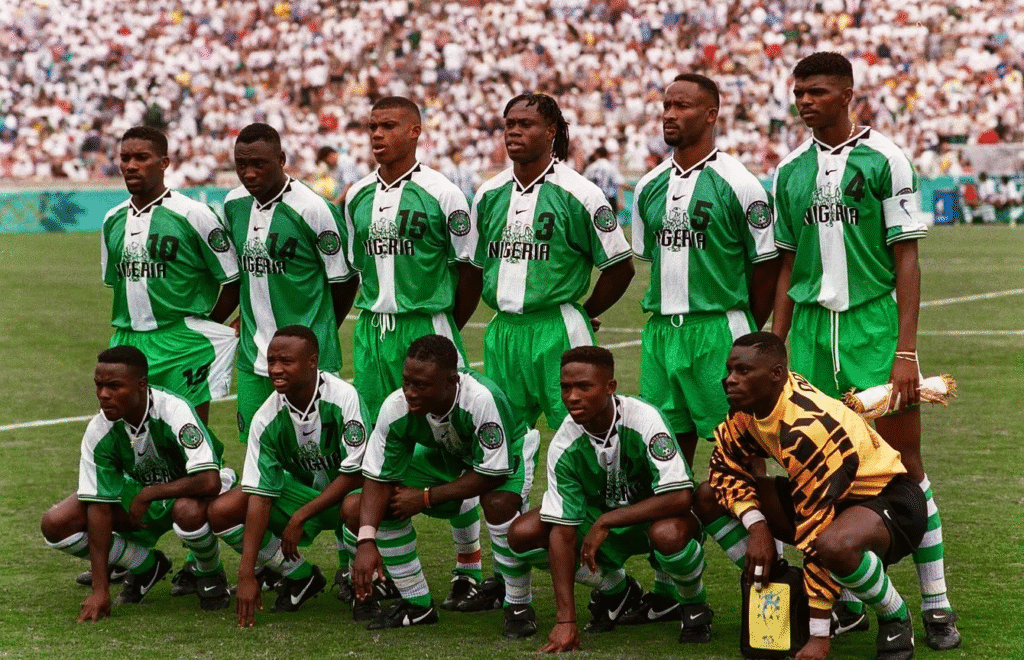
The Nigerians became believers again after defeating the Almighty Brazilian team to advance to the showpiece final. Four days after their exhilarating semifinal tie, they took on Argentina. The Argentine team, coached by Daniel Passarella, was not a slouch; the squad was brimming with talent, including Javier Zanetti, Ariel Ortega, Diego Simeone, Claudio López, and Hernán Crespo.
“I’d say that we only started to think about the gold medal after our semi‑final victory over Brazil,” Ikpeba told FIFA. “We were 3‑1 down in that match but managed to draw level at 3‑3 before going on to win 4‑3 in extra time. God was on our side!”
The Argentines grabbed an early opener, with a well-placed header in the 3rd minute. The Super Eagles responded with an even better header in the 24th minute, as Celestine Babayaro notched his second tournament goal with a powerful header.
The game was end-to-end, and Taribo West conceded a penalty. Crespo stepped up and buried it emphatically. Despite guessing correctly, Nigeria’s goalie could do absolutely nothing about it. Nigeria’s mentality monsters kept their cool and upped the intensity of their performance. They had been causing problems with their throw-in routine during the tournament, and grabbed another goal via another throw-in situation. Substitute Daniel Amokachi was the hero, flicking his shot deftly over the Argentine goalkeeper in the 74th minute to erase the deficit.
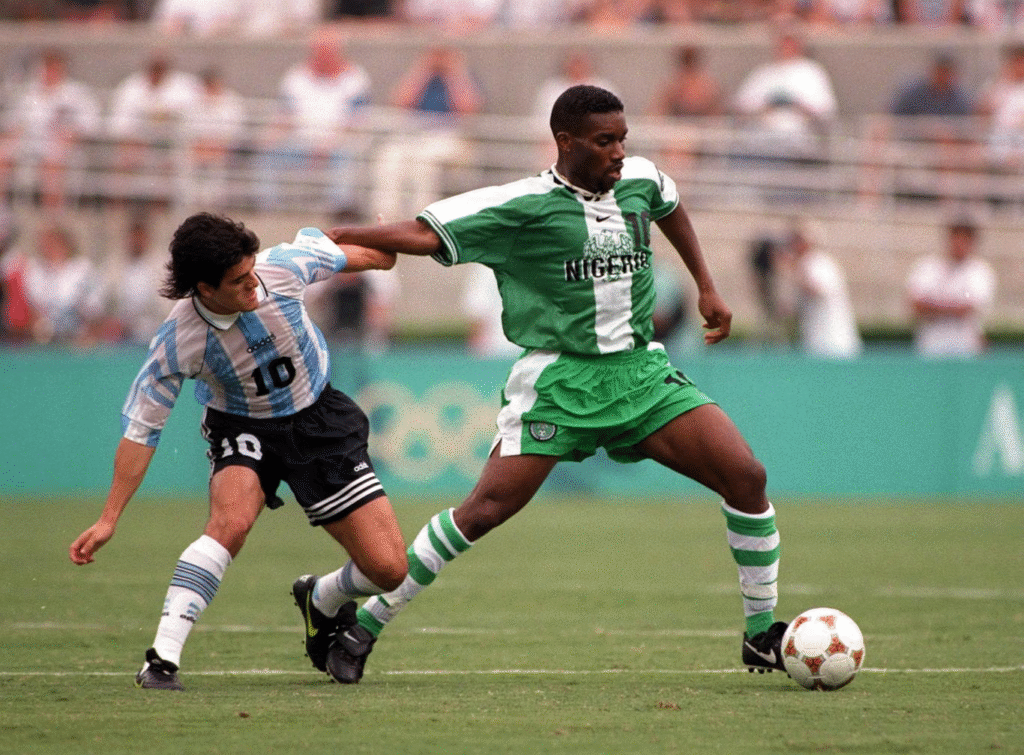
The game was tied in the 90th minute, and both sides needed a hero to step up and fire his team to victory. One hero!
Nigeria was awarded a free kick in the 90th minute, and everything came to a standstill for a minute. Wilson Oruma stood over the free kick, teasing a sumptuous cross; his inswinging delivery was purposeful and determined. Emmanuel Amuneke intelligently beat Argentina’s flawed offside trap and was unmarked in the box, hammering the ball into the net on the volley. History Makers! World Champions!
The Nigerian team had defied all odds to emerge as Champions. An African team decimated all opposition for the first time and clinched an Olympic Gold medal. Every little boy’s dream had become reality. The Dream Team had realised the stuff of dreams! The joy, ecstasy, and disbelief on the faces of the Nigerian players were palpable. They had etched their names into the annals of history forever.
“It was a truly unforgettable tournament. I was thrilled to take part in it, represent Nigeria, and, in particular, to emerge victorious. When I look back on it, I realise just what an amazing achievement it was. We went on an extraordinary run by beating Mexico 2‑0 in the quarter‑finals, Brazil 4‑3 in the semis, and Argentina 3‑2 in the final,” Ikpeba recalls. “I can picture myself 28 years ago with that gold medal dangling around my neck. I was ever so proud of that feat and to be a member of the very first African side to be crowned Olympic champions,” he says.
The Dream Team: National Icons and A Continent’s Pride
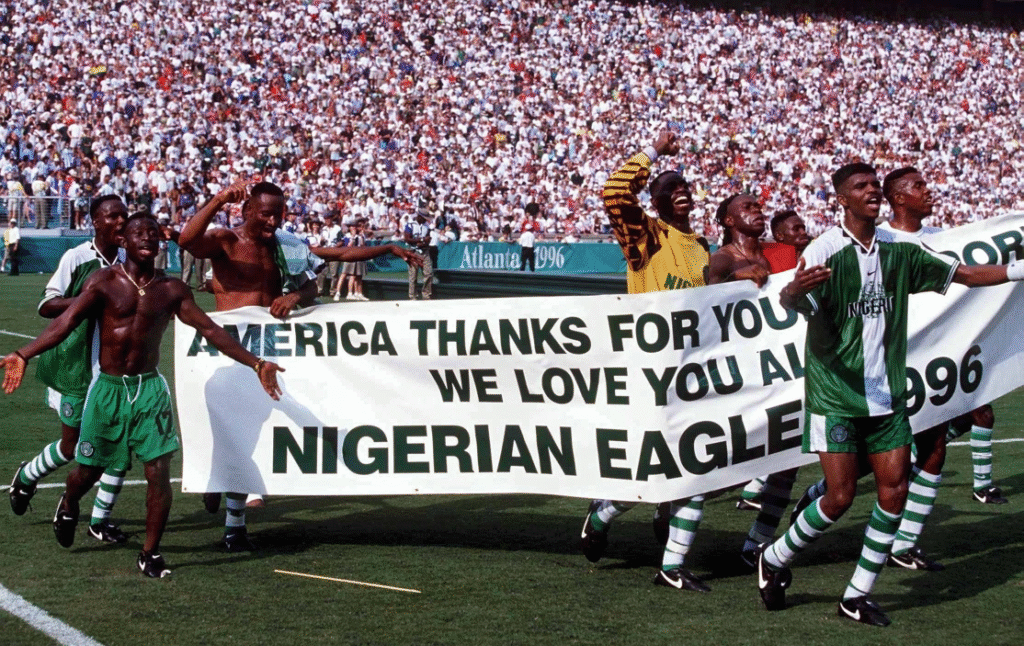
Trailblazers, icons, and legends set the bar so high that you could only admire and struggle to match their legacy. Their global triumph brought great joy and immense pride to Nigerians. The children, youths, adults, and the aged were thrown into jubilation back home in Nigeria, celebrating the triumph fervently in streets, churches, mosques, and stadiums; in every corner, you could find someone celebrating. A divided nation united in happiness.
The triumph was celebrated wildly across the African continent. The Dream Team’s remarkable journey became The Holy Grail of African Football. The Dream Team’s success laid the blueprint for African teams to compete evenly and succeed on international stages. This was immediately evident in the next Olympic Games at Sydney, where Cameroon won the gold medal in similarly impressive fashion.
2000 Gold medallist with Cameroon, Serge Branco recalls: “I was 16 years old in 1996, and I didn’t miss a single match involving the Super Eagles. It was the first time an African nation had won the Men’s Olympic Tournament, which was a source of huge pride for us. They showed us that it was possible and that you could be African and shine on the international stage.”
The Legacy: Failed Succession Quests and Hope for the Future
Global icons and idols, home and abroad, the Dream Team left an indelible mark on Nigerian football. Sadly, their legacy remains unmatched in the West African Nation. Their continental and global triumph was meant to usher in a new lease on life, heralding a period of Nigerian dominance. However, reality often differs from expectations.
Nigerians can flashback to Beijing 2008, The closest Nigeria has come to repeating their heroics. The fresh-faced youngsters led by John Obi Mikel went to the final but were defeated by an Argentine side that featured a diminutive magician, Lionel Messi.
Nigeria added another medal to their medal cabinet at the The 2016 Rio Olympics, securing bronze with a victory over Honduras in their third-place match. Mikel Obi captained the team again, as an overaged player on this occasion. This achievement made Nigeria the most successful African nation in Olympic men’s football, with one gold, silver, and bronze medal.
Nigeria’s Dream Team has been a benchmark and inspiration for multiple generations of Nigerian players. The younger generation aspires to be like them, dominating the best nations and making the West African country proud. Nigeria produces world-class talents yearly; they need the right system to make the players thrive.
Ikpeba’s advice to the younger generation in an interview with FIFA: “You have to put in a lot of hard work and, above all, to believe! Being part of a group and being around each other every day isn’t always easy, but our big strength in 1996 was that we formed a small family. With all the ups and downs we faced, we were keen to prove to our people that we were capable of succeeding.”

